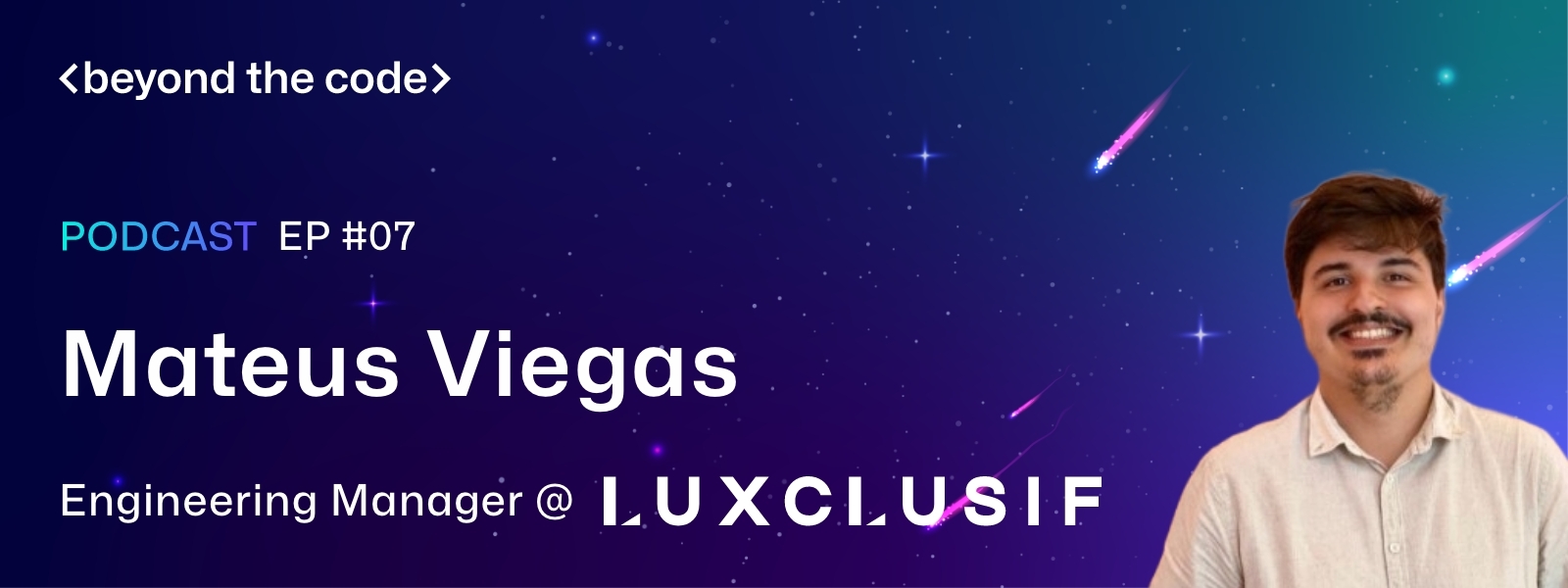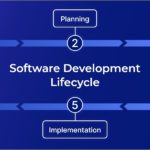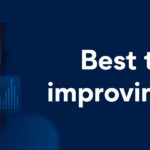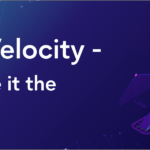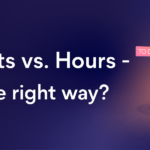In our recent episode of Beyond the Code, Host Kshitij Mohan, founder of Typo, engages in an insightful conversation with Mateus Viegas, Engineering Manager at Luxclusif. The central theme of the discussion revolves around fostering innovation and well-being in dev teams.
The podcast starts with a fireside chat with Mateus, providing us a glimpse into his personal background. The conversation then takes a deeper dive into dealing with challenges when transitioning from developer to managerial role. Further, he sheds light on the ways to get a bird’s eye view of the team’s dynamics and operations. Mateus also imparts a valuable perspective on enhancing the experience and well-being of developers.
Wrapping up, Mateus provides thoughtful advice to fellow engineering managers in the field.
Timestamps:
- (0:07): Mateus background
- (2:20): Fireside chat with Mateus
- (5:07): Overcoming challenges when transitioning from developer to manager
- (9:08): Shifting the mindset
- (10:52): Getting bird eye view of the team’s culture and operations
- (12:15): Diving deeper into fostering high-performing teams
- (14:54): Developers’ well-being and experience
- (17:56): Mateus’s advice for fellow engineering managers
Links and mentions
Episode Transcript
Kshitij Mohan: Hello, everyone. I’m Mohan your host back with another exciting episode of Beyond the Code by typo. Today’s guest comes from the football Frenzy Nation of Portugal. He is a renowned engineering leader, a published author, an ex-CTO, and what not. He brings a unique mix of creativity, engineering, and leadership. Please meet Mateus. Hello Mateus. Welcome to the show.
Mateus Viegas: Hi Mohan! Thank you so much for the nice compliments. Just a curiosity, I, I have actual dual citizenship. I was born in Brazil and live in Portugal nowadays.
Kshitij Mohan: Basically you belong to both the Ronaldos? I think so lucky
Mateus Viegas: Yeah, exactly.
I wish I had their abilities, but that’s okay.
Kshitij Mohan: Perfect. Thank you so much Mateus for sharing your time with us. This really means a lot. Perfect. I think before I get started with anything mateus, this is one question that I can’t just stop myself asking from. How did you get time to publish a book while doing everything else that you have been doing?
Mateus Viegas: I mean, it was in the pandemics. We were locked in the house and the opportunity came by. So I can’t deny that it was like quite a big challenge because, I mean, it took a long time and a lot of back and forth. But yeah, basically the pandemic have to be inside the house, so nothing else to do, yeah!
Kshitij Mohan: Perfect, I think you grabbed the opportunity with both hands definately. so man, Congrat to you Mateus!. By the way, how does it feel to be a published author? Like, anything changes or is it all the same and all?
Mateus Viegas: I mean, I did it most for personal experience, you know because I always struggle as a person to commit myself to long-term projects. And I knew that the book was going to be like a really long-term project, like two two-year project.
So it’s really like an exercise for me, for discipline. And that was the thing that I was searching the most, like really to commit to long-term things. And for me, it was played really, really nice in the sense, in that sense, I didn’t think about money, about reach, about nothing like that was more like a personal experience.
So yeah, that’s it.
Kshitij Mohan: Perfect. I definitely, that’s, that’s great Mateus. So Mateus, given the kind of experience that you bring in, I think today we would love to talk about how to drive innovation and well-being in dev teams. But again, before we do that, there is always a fun fireside section that we do with our guests.
I would ask a quick series of questions and we would love to know the personal Mateus to go about, and then that’s all how it goes. So if you’re all set, I would love to get started.
Mateus Viegas: Yeah, sure. Let’s go.
Kshitij Mohan: Perfect. So let’s get started. We know from your profile that you visit a lot, you like love to drive in nature, take photographs.
So I think the first question would be that what’s that one most breath-taking place that you have visited? That you just loved and you just can’t stop yourself taking pictures from?
Mateus Viegas: Well, I mean, that’s a tough question. Being born and raised like in an ocean country, in a coastal country like Brazil, I’m from Rio originally, I was always amazed by mountains and by how huge they are in this kind of thing, right?
So every place that, every place where there are like these big mountains are pretty places that mesmerize me. But there, there’s one place that, I mean, it’s my dream place because it looks really like another planet, which is Iceland. I went there like almost 10 years ago and it just can’t get off my head since then. But there are a lot of places and mountains in general.
Kshitij Mohan: No, definitely. I think Iceland is definitely one of the most naturally gifted countries to be with. Like definitely. Perfect. Question 2, This is for the developer Mateus, What’s your favorite Algorithm or data structure?
Mateus Viegas: I am thinking of this right now and I think that, I would call it the merge sort. Because it really forces me into like thinking of breaking down a problem, like to that divide and conquer approach. You know, it’s like really breaking down bigger problems in chunks of smaller ones. So I think, and it’s quite fast actually as well, so definitely. But mainly because of the reasoning of like breaking things down and I really like this, this kind of approach.
Kshitij Mohan: So question three, what’s that one favorite tech gadget that you can’t live without?
Mateus Viegas: I have to see my camera. I mean I have a tiny camera. The Fuji Film three. It’s not a new one, but it’s the one that I carry around all the time, so that’s my tech gadget.
Kshitij Mohan: Yeah. Perfect. Question four, What’s that most inspiring quote that you live by? What inspires Mateus?
Mateus Viegas: I like to say that I’m a pretty sentimental guy and there was this cult, from an American out of college that I heard like years ago that says, “Nobody has ever measured, not even poets how much the heart can hold.” And it’s something that really inspires me in living with my family and living with the people that I love and doing the things that I love.
So I think that is my motto, I would say.
Kshitij Mohan: Thanks, Mateus. This was real fun. Thank you for being such a sport. I think now getting to the real stuff, getting to pull out some insights from your experience. Right? So you have seen this entire journey from a developer to a manager, to a leader. You have seen it all. And I’m pretty sure this must not have been easy, right? You must have faced certain set of challenges that you, you must have felt, Hey, this is something that I need to deal with. I think we would love to understand those set of challenges that you think, Hey, this is what made me to the next level of where I am today. And, how did you kind of overcome those situations?
Mateus Viegas: Yeah, I think that coming from a software engineering background of being a developer, I think that one of the biggest challenges that I personally faced, it was like the feedback loop is different. So when you’re a developer, you’re like writing code and you have test suites and you can iterate and fail and try again the red-green refactor kind of thing. But when you’re like leading teams, It is like a change of mentality because it’s not so much the output that matter, but more the outcomes. And the outcomes usually take a little bit more time to compound. So one thing that I’ve tried to do is like, well, I’m a manager. I’m not seeing any result, I have to be totally hands-on again. So I started being hands-on, but that just got things worse because I took enough space from the team, I took autonomy from the team. I was actually being more of a blocker than a blocker removal. So I mean, really to making this switch was something that was a huge mistake that I did. And my team surely had paid the price at that time. And thank you folks for understanding and for making me improve as well publicly to them, because I mean, was my biggest challenge at all. It was like to change the motto, you know, to change like this perspective. Okay. Now I’m not more like the guy who codes, but I have to try to make the guys who who are actually coding do their best, so empower them. So really make them shine and understand how can I help more as a support than as an another operational team, another operational folk. So I think that was one of the biggest challenge that I have faced.
Kshitij Mohan: Right. So basically moving from this mindset of doing it yourself to enabling teams, how to do that is really what the biggest mindset shift is. Definitely!
Mateus Viegas: Yeah. Yeah, exactly. And that, that was something that one really nice manager that I had told me, he said to me, because I said to him I have too much, I can’t do this leading thing anymore. And he said to me, of course, you’re having too much. You’re coding! Why you’re coding? And that, and that just triggered me because, I mean, I can surely help the teams with my technical background in architectural review with things, these kind of things. But I was like taking too much time trying to do both things, wear both hats, and it just doesn’t work. So also a big thing to my manager at the time who shined the light on me because was it really helpful
Kshitij Mohan: Right. No, definitely. And any specific practices that you followed to change your mindset? So basically before jumping on to saying, Hey, let me, let me finish this up. You were in a mindset, Hey, how do I actually define things for others? Right? So how did you balance this out and like gradually shifted to where you are?
Mateus Viegas: Yeah. I think that for me one thing that really motivated me I didn’t like to see my team struggling. So I think that by coding I will remove the struggle from them, but I was also removing the learning from them.
So it was really like a mind treat for me to say that they have to go through it as well. They have to struggle sometimes. They have to face this challenge in order to know how to overcome them. So, it was really like. Really making a switch in my mind to say, okay, let me step back. Let me see a little bit of chaos. And if needed, I can step in.I can step in somehow. But sometimes it is good to have a little bit of chaos. Sometimes it’s good for the teams to good character and to learn.
Kshitij Mohan: No, I think definitely this totally is the right way but one thing in doing that Mateus is, right. So while doing this, how do you balance this act that, hey, till this time, let the team figure out on its own and, and from a time, Hey, no, no, this, this is not happening. I have to step in and kind of figure those things out. So how do you do that?
Mateus Viegas: Yeah, I think that is really like, about something about defining expectations.
You know, when building teams, one thing that I always had in my mind in I have to, to hire the best guys that I can afford this role. If I hire them, it’s because they are more than good enough. They are really like pros in what they do. They know what they’re doing. So it was really like, okay guys, you know what you’re doing, we have to reach there. So my goal was really to provide alignment and give them autonomy, because autonomy without alignment, I mean, it just doesn’t make sense, right? But it’s really like, okay, we are aligned that we need to get there. I don’t know how you guys tell me how, how do we get there? What do you think that is the best way? What do you think that are the challenges that we might face? What do you think that are the risks that we might have to take together? But that is the place, or it’s really that the place do you see? So it’s really about like fostering them, this sense of autonomy so that they can really be accountable for how they get there. And my role is really to provide direction, provide alignment, and try to remove any noise that might be in between. And was mostly is really like making a step up, step out, and doing more like a bird eyes view of the thing, the perspective, like really elevating the perspective and empowering the teams. I think that was mostly really a changing of mindset.
Kshitij Mohan: No. Perfect.. And I think as you mentioned, right, getting this Bird eye’s view, so any specific tools or any specific kind of dashboards that you were using maybe to get this entire picture? Or was it more of a conversational-driven way where you were setting up meetings and trying to understand what’s happening?
Mateus Viegas: I really like a dashboard too called the Google Sheets. Just kidding.
Kshitij Mohan: That’s the master of all.
Mateus Viegas: Yeah, exactly. But basically one thing, that I really like to do with my team is like, one process that I really enjoy do is the goal setting. You know, so we have, for instance, the goal setting as a company, one desire outcome and we discuss as a team, what are the team set, the team’s objectives, the things that we need to reach as a team, the deliverables that we can contribute with. So it is really like to compounding goals, right? So we have this team goals that we have to compound and individually with each, each team’s member. What are your goals that you think that you can set for yourself that might help us to compound into this one. So one thing that I really like to do is to track with them these goals. Like they have their own spreadsheets with their goals. We have a template as of now where they do the tracking and we do kind of bimonthly check-ins and we see the things compounding in a way. And if all these goals are compounded, we are like, It’s not certain that we get there on the main goal, but we are closer. So it’s something that really like to use to track this.
Kshitij Mohan: Definitely, Mateus. So, this is great now coming to this team-building part, right? So I think as you also mentioned, autonomy and alignment. It’s also important that how do the teams communicate, collaborate, right? And in order to ensure that the entire development process is smooth and efficient. I think that’s the foundation of every, high-performing dev team, I would say, right? So how did you foster that? Any specific things that you worked on to ensure that’s in the right place?
Mateus Viegas: Yeah, first thing I think that is important for everyone to know their roles and their responsibilities within a team. So regarding the responsibilities, one thing that I really like, to have clear for everyone, and I really like to have a document, is what I call the engineering playbook, where basically we say what is our way of planning. Where is like the software development life cycle that we had. Where is the approach to code reviews? Where is our approach to monitoring? What is our approach like to considering something done? So really defining this playbook of like more like a basic common ground and starting from there. So we know how to work. I don’t think that is also set in stones in different teams. Like you have kind of different playbooks, but having this engineering playbook of like standardizing the basics of the software development lifecycle for that team, it starting there, this is our process. So mostly within this process, letting everyone compound. One thing that we started to wait like more one year or so with, with the teams that I really started to see in the results was for instance, like their RFCs and the proposals of implementations and where basically we had a lot of times different people, different backgrounds, different experience, different opinions, different personal tastes. So one thing that I really like to drive consensus within the team, within the planning process, are RFCs, because someone proposes something, everyone’s puts their comment in and we get to have like, More rational trade-offs of the pros and cons of each alternative. And at the end of the day, try to remove the emotion a little bit, even though I’m emotional guy. Try to remove the emotion of the decision process by really facing, we have these on our hands, these object pros and cons. So which one’s the best? And when we are not able to decide, we vote and move on. So it’s really like having a standard ground of rules and basically driving consensus. Try to remove emotions and be as rational as possible with the decision-making.
Kshitij Mohan: Right, So basically setting the right processes and then ensuring everything is aligned to that is what it takes to set the right processes. Makes perfect sense Mateus, I think, the last topic is very close to my heart, and I would really love to know your thoughts around that. Right. So developer experience and wellbeing. I think this is the next buzzword, I would say, in the entire tech industry. And I’m pretty sure you must be aware of it. Right? And this has specifically, the entire scenario has changed. We all know after the Covid scene, and that’s when a lot of, more and more people have started talking and writing and printing stuff around it. So I think first, to begin with that, I’d love to understand your perspective on this entire developer experience aspect, which in the end, everyone talks about translating into productivity, right? Your thoughts on that Mateus?
Mateus Viegas: Yeah, I think the developer experience is a quite broad term, you know? I mean, we can extract a lot of things from it, but the way I see it, I see it from two perspectives I see from a qualitative and from a quantitative perspective. I see the quantitative one as metrics that we can capture through surveys or softwares that express something like how long does the team take to ship something? How long does this team take to fix something? May provide some signals of let’s say, the technical health of the team. Right? But for me, those quantitative things are more like signals. And what about the qualitative things? How can we extract them? I’m not a DevX expert, so I really don’t know about everything about it, but I think that One thing at least the developers that I work with, really, really enjoy is really like having feeling that they have a say in what they are doing. Feeling that they have a say in what they are deciding. So really like providing them with the big picture, providing that the reasoning why we are doing this. So first questions. First question is why are we doing this? Do folks understand? Why? Do folks understand? Also, what are trying to solve the main goal, right? And basically empowering them. So I think that empowerment will be the one word that I will use, to give like, not to give, but to translate, not a better developer experience, but to try to give the developers a better experience. So, I mean, really empowering them with enough context, empowering them with the decision making, empower them with the abilities that they, they bring to the table, you know? So, and that comes from the truth. That is more this, let’s say the qualitative thing, the subjective thing, and comes to being close to them. So like tightening the feedback loop, having one-on-ones. In the one-on-ones, we would talk eventually about work, but the first question shouldn’t be about work, but how you’re doing. How are things going for you? How are you feeling? So it’s really about understanding the people that you have with you. Understand their wishes, understand where they want to be, and giving them enough power to do the best job that they can do. So, That’s why I say that my perspective’s a bit subjective.
Kshitij Mohan: No, no, definitely, I think everyone is trying to figure out the right developer experience, what it means, how do you create it. So I think that that definitely helps. Mateus, and I think just before we close our discussion, one piece of advice that Mateus would like to give to all the EMs out there, right? One critical piece that they should be very much focused out while driving everything, while managing all the chaos that’s around there.
Mateus Viegas: Yeah, but that’s a hard one because I don’t see myself in position to give advice to so many brilliant people out there. I think that one thing really important is that I just said, like, I mean, being close to your team. Know that they are before developer human beings and try to develop a relationship with them. I think at least for me, it changes that lot in the way that we can approach things, that we can really conquer things. So stay close to your teams, know how they’re doing, know their challenges, and yeah, just stay present.
Kshitij Mohan: Perfect. This was great, Mateus. Thank you for sharing all your insights and experiences with us.
It had been such a fun, fun conversation. And again, all I can say is you are so lucky to have both Ronaldos working with you. So I think that’s all wanted is, that’s how we can summarize this for you.
Mateus Viegas: Yeah. I can’t say my personal preference of the ones. Because I play.
Kshitij Mohan: I can’t even go there and ask you about it. That won’t be a fair question. Thank you for your time today. It was such a great conversation. Thank you. Have a good day, Mateus. Take care.
Mateus Viegas: Thank you, folks. You too bye-bye.

